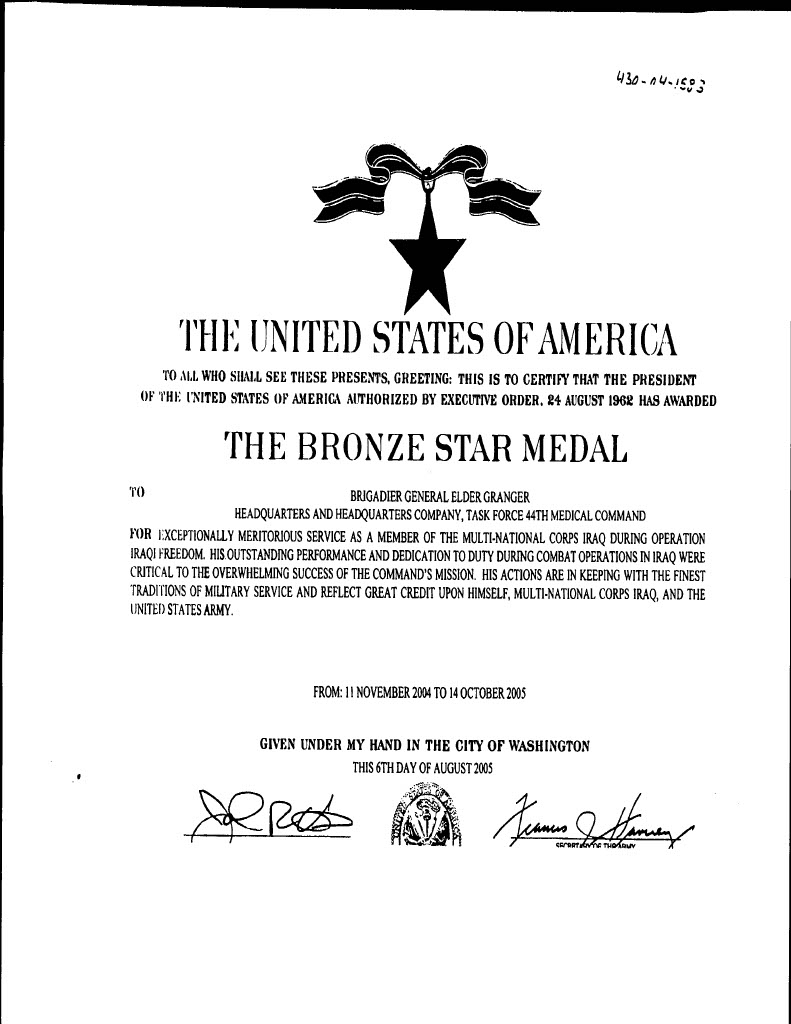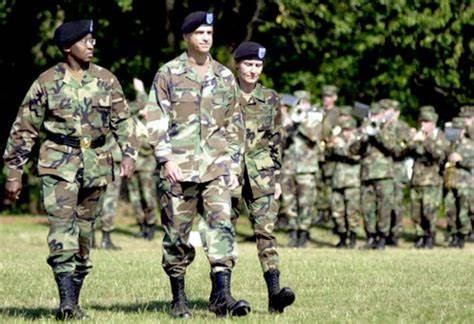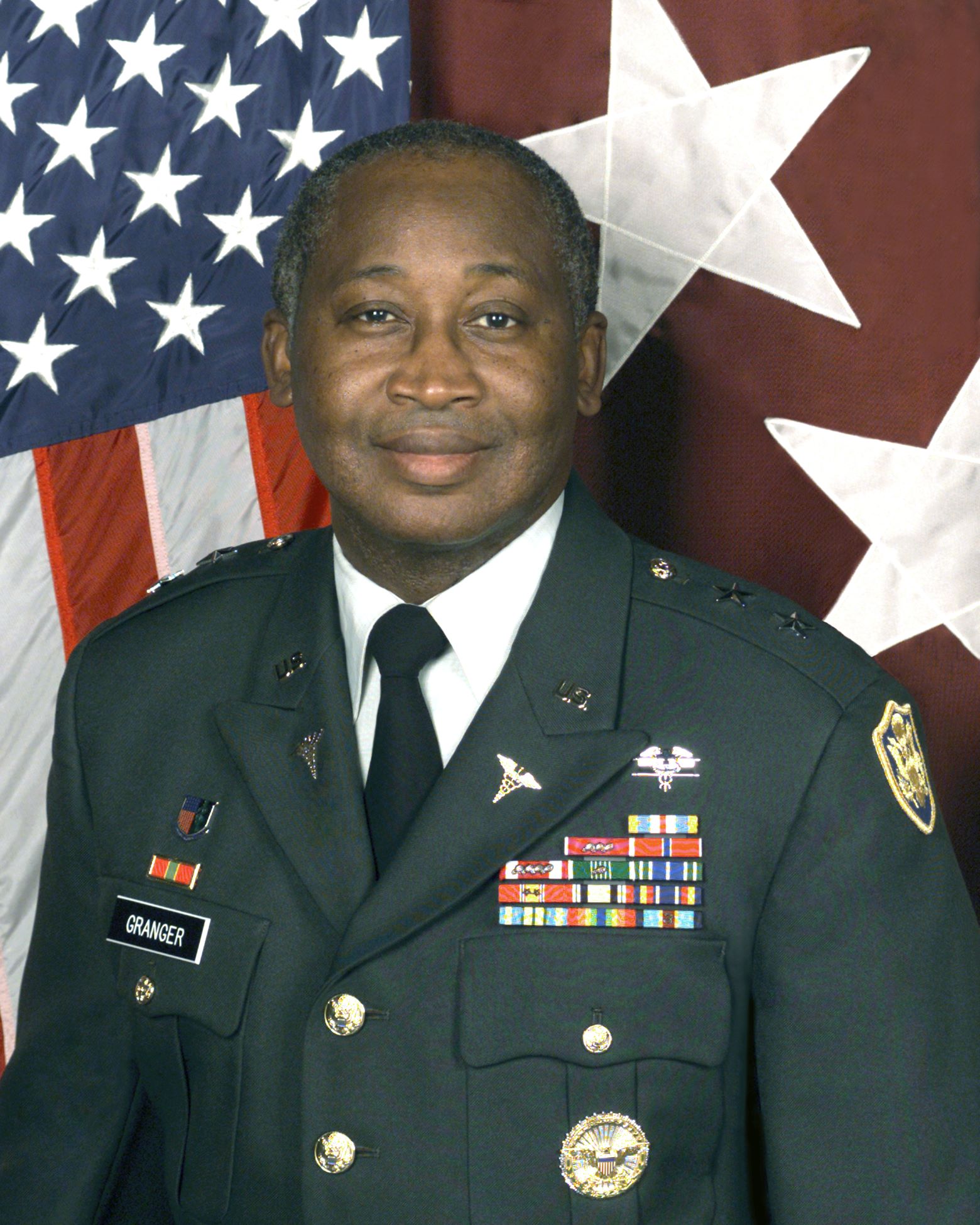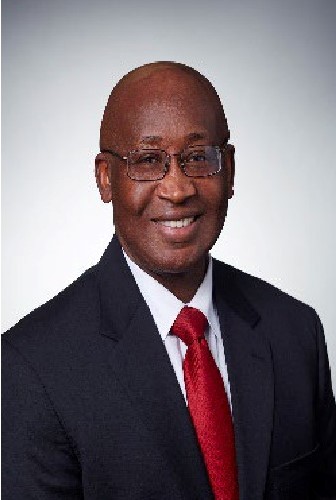Record date:
Elder Granger, Major General, and Physician
As a middle child in a large family, Elder, born in 1954, could often be found reading in his home’s quiet spot, the closet. Growing up an African American in West Memphis he internalized his community’s emphasis on merit: “Let the race be their problem, not your problem”. Unfazed by the first day of integration at West Memphis High School, he prevented an attack on a young White teacher. His “second mother” was Miss Sarah Prewitt Eaton, a White woman who taught and owned the county’s only kindergarten, and with whom he formed an instant friendship when packing her groceries.
Granger and his friend joined the Arkansas National Guard during his senior year, in 1971. Following graduation, he did basic training at Fort Polk and AIT, Combat Medic training at Fort Sam Houston, graduating number one in Oct. 1972.
In January, he began his studies at Arkansas State University. After he learned about ROTC and its scholarship, he relinquished his Guard duty. The two summers that he and a friend/fellow pre-medicine student participated in the Health Career Summer Programs at Harvard University were pivotal. Although Granger was accepted to study medicine at the historically Black Meharry Medical College, he later learned of Dean Bruce’s “experiment” to increase the number of Black students at the University of Arkansas Medical School. Wanting to disprove racist assumptions, he chose to study there. At that time, Granger married a woman from his community who was pursuing an MA in education.
After graduation, Granger merited a prestigious Regular Army commission and he did his internship, residency (in internal medicine), and fellowship (in Hematology-Oncology) at Fitzsimons Army Medical Center in Aurora, Colorado. The couple’s son was born there. They had what turned out to be a last visit with Miss Eaton whose love for Elder and family must have been felt by their normally fussy baby, who was at ease in her arms.
In 1988, Dr. Granger went on a “field utilization tour” at the 2nd General Hospital in Landstuhl, Germany. He established a full-blown hematology-oncology department there and rose to the position of Chief of the Department of Medicine. Although administration would have been the next logical career move, Granger wanted to continue to treat patients, as well and became the Deputy Commander of a small hospital in Fort Huachuca, Arizona.
In 1992, Granger was back in Colorado working as the Division Surgeon for the 4th Infantry Division at Fort Carson. He was responsible for the health of 14,000 troops, and their families. The priority was ensuring that troops were ready for mobilization since a healthy body is a prerequisite for combat and so their immunizations, dental work, etc. needed to be up to Army medical readiness standards. Within his eighteen months, their medical preparedness increased from 30% to 95%.
In 1996-1997, Granger had been selected to study at the Army War College, Carlisle Barracks, Pennsylvania, where he developed his strategic thinking. Granger was then selected to turn around the dire fate of the Ireland Army Community Hospital, Fort Knox, Kentucky. He resourcefully found ways to make it viable and developed his “Five Ps Philosophy” to determine value and relevance. He always pursued professional development and he now took courses on the business side of health care. Fort Knox also suited his family; his wife was an assistant principal, and his children completed their high school studies there.
The Granger couple was pleased that his next assignment as commander of the Landstuhl Regional Medical Center would bring them back to Germany and friends there. Next General James B Peake invited Granger to work as the assistant surgeon general for Health Policy Service MEDCOM. In 2001, Granger was based in DC to better understand the coordination of Big Army, DOD, and interagency. Granger’s first day on the job was 9/11! Instead, he organized the medical preparedness of National Guard and Reserve units slated for mobilization to Afghanistan.
After he was promoted to brigadier, Granger’s next assignment was that of Command Surgeon ERMC [Europe Regional Medical] based in Heidelberg where he not only oversaw hospitals and clinics but managed TRICARE Europe.
In July 2004, Granger was assigned as the Surgeon for the 18th Airborne Division at Fort Bragg. He was responsible for the medical preparedness of 105,000 soldiers in the Northeast. However, in October, with heightened troop deployment to Iraq, he directed medical preparation for the units that would be deployed imminently. In November he was sent to Iraq and for the next eleven months delegated responsibilities at Fort Bragg to the next two senior commanders. He would videoconference with them weekly.
Simultaneously, Granger served as commander of Task Force 44thMedical Command and Surgeon for the Multi-National Corps, Iraq, General Peake entrusted him to pioneer the implementation of a computer system that documented health on the battlefield, a standard today but revolutionary in 2004. That meant training personnel to use the system and conducting a pilot project carried out at the 86 Combat Support Hospital in the Green Zone in Iraq
In thinking about data, Granger explains,
“You have to think tactically… operationally, how do you have oversight, and strategically, what are you looking… to next year or months down the road. “
In that vein, Granger called upon experts in each field to not only input their respective military field manuals but to update them, rather than wait for changes in doctrine. Data was structured in a way to provide flexibility. For example, medical practitioners were classified not only according to their job titles but also according to their other specialties. Or they collected information on the types of trauma wounds so that practitioners beyond the battlefield could zero in on the appropriate treatment afterward. Additionally, doctors began to identify where more data was needed and conduct research, for example, on the effectiveness of blood components vs. complete blood. The transfer of electronic information including X-rays, scans, and images of stained tissue samples, from the battlefield to doctors in the US or Germany was also initiated.
Granger’s modular and flexible approach applied to practitioners too. He set up joint combat health support teams with a range of skills who went far forward into the battlefield. Or he established mobile and specialized teams. He adopted technologies such as inserting a robot in the operating room allowing a remote surgeon to see a wound and advise an inexperienced surgeon. The optimized system meant that if a wounded soldier got to a medical team, even to a combat medic, he had a 95 percent chance of survival. In addition to the responsibility of human healthcare, Dr. Granger also oversaw the 400 bomb-sniffing dogs. Nor would Granger shy away from visiting troops on the battlefield.
Granger also worked with the Iraqi surgeon general, Dr. Samir Hassan, to develop its own medical force and help them cultivate respect for female health practitioners. He also describes the synchronizing of efforts of the countries in the Multinational Corps.
Granger is grateful for having received the Bronze Star Medal for his work in Iraq, but he is more concerned about recognizing others. Yet when Meharry’s president read the young Elder’s hand-written letter of refusal and awarded him a medical degree, it did tickle his fancy.
From 2005-2009, Granger and his wife could be found in Fort Belvoir, Virginia. He was the Deputy Director and program executive officer of TRICARE. In 2009, he retired from the military not wanting to compete with his mentor General Peake for a position. With his wealth of experience, Granger,in partnership with his wife, established their own company called THE 5Ps, LLC (People, Process (es), Prevention, Productivity, and Price).
He is proud of his children’s career choices. His message: Be a servant of others, bring them with you. Help the young go one step further. Otherwise, you will be a legend without a legacy.

















